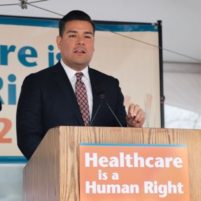Does California want single-payer healthcare?
February 27, 2017

Ricardo Lara
With Republican lawmakers and President Donald Trump planning to repeal some, if not all, of Obamacare, California’s Democrat-controlled state government is considering the idea of instituting a state-run single-payer system that would operate like Medicare. [LA Times]
A single-payer system currently exists in Canada, but it has not been adopted by any state in the United States. Earlier this month, State Sen. Ricardo Lara (D-Bell Gardens) introduced a bill that would make California the first state in the nation to adopt single-payer healthcare.
“In California we say we want health care for everyone,” Lara said last week at a universal health care rally. “In California, we say that health care is a human right.”
Lara also said in an interview that, now more than ever, universal healthcare is popular in the minds of Californians.
If California were to create a single-payer system, private insurers would be replaced with a state agency that would function as an insurance company, paying doctors and hospitals when people seek treatment. All Californians would receive access to health care via the state funded agency. Residents who currently receive insurance through employers would receive coverage through the state.
Bills calling for a single-payer system in California previously made it through the Legislature in 2006 and 2008. But, then-Gov. Arnold Schwarzenegger vetoed both of the bills.
Previous proposals suggested financing the state insurance agency by pooling California’s current funding for Medicaid, Medicare and other health programs, then taxing employees 4 percent of their income and employers 7 percent of payroll. However, a 2008 report produced by California’s Legislative Analyst’s Office found that, even when coupling a tax with pooled state healthcare funds, California would be short more than $40 billion in the first full year of implementing a single-payer system.
“Where were they going to come up with the $40 billion?” said Micah Weinberg, president of the Economic Institute at the Bay Area Council.
Weinberg said single-payer is not feasible to do as a state. He noted a single-payer initiative was scrapped in Vermont, and a single-payer measure that appeared on Colorado’s November ballot failed.
Government officials and healthcare analysts in California have floated other policy proposals the state could adopt instead of a single-payer system. Those suggestions include mimicking how Massachusetts provided universal healthcare and creating a public option — a state-run health plan that would be sold on California’s insurance exchange.






The comments below represent the opinion of the writer and do not represent the views or policies of CalCoastNews.com. Please address the Policies, events and arguments, not the person. Constructive debate is good; mockery, taunting, and name calling is not. Comment Guidelines